March 25, 2006
What game is Henry Ramos Allup playing?
So far, so good. But then yesterday, when news came that Jorge Rodriguez had agreed to step aside from CNE - undoing one of the key obstacles to realizing Meeting Point's first and central demand - AD Secretary General Henry Ramos Allup flipped, telling reporters:
"Everyone should understand that even if they guarantee hand-counting of votes, nothing changes if you have five hustlers upstairs who undermine it, who alter the tally sheets. What good is a manual count with a twisted voter registry? With [Jorge Rodriguez's] exit nothing changes if they don't take concrete steps for people to be convinced that the system is trustworthy, because people are not going to vote and there will be very low turnout come hell or high water." (llueve, truene o relampaguee.)
Hmmmmm. Which one is it? Is AD actually trying to work pragmatically towards proper voting conditions? Or will they keep moving the goal posts, discounting the possibility of a fair vote a priori, as a matter of dogma? What's the point of sending lists of demands to CNE if you've already decided there will be very high abstention "come hell or high water"? Precisely what kind of twisted game is Ramos Allup playing?
The less reactionary of the oppo party groupings, Primero Justicia-led "Together for Venezuela" (isn't it funny how the more divided they get the more they use words like "meeting" and "together" to call the splinters?!) called Jorge Rodriguez's decision "an important step."
Hey, I'm not saying the next CNE will necessarily be better than the last (how could I?) I'm just saying it's really bad form to start slinging mud at it pre-emptively, before we even know who'll be on it.
March 24, 2006
Jorge Rodríguez out of CNE
The worst case scenario has been averted. In a speech oozing out-of-place bitterness, opposition bete-noire Jorge Rodríguez says he will not put himself up to reappointment to the CNE board. The door is now open for the National Assembly to choose a CNE leadership able to command the entire country's confidence. Will Chávez go for it?
This is big, big news.
The case against primaries
Lets see. In the US, the country with the longest tradition of using primaries to choose presidential candidates, the trouble with the system is well understood. The Primary Dilemma, to give it a name, is that the positions a candidate has to take to win a primary are often at odds with the positions that win general elections.
The Democratic Party primaries are decided mostly by democrats - who by definition are more liberal than the electorate as a whole. In order to be competitive in the primaries, Democrats come under a lot of pressure to parrot the Democrat party line on a whole series of divisive issues - from affirmative action to teachers' unions to gun control. But those positions are obviously more popular with Democrats than with the electorate as a whole, so a candidate who wins a primary by sticking closely to the party line finds himself in trouble in the fall.
Of course, Republican primary candidates face a symmetric dilemma.
Now, four decades of experience with the system have served a purpose in the US: American party loyalists have learned the hard way that selecting candidates who are too partisan is a losing strategy for the fall. Barry Goldwater's disastrous 1964 campaign cured the GOP's appetite for extreme partisanship in primary candidates, and George McGovern's 1972 and Walter Mondale's 1984 campaign worked in the same way for the Democrats. By now, primary voters are well aware that it's no use choosing somebody who can't win in the fall. In other words, primary voters understand the Primary Dilemma, and so "electability" has become one of the key elements in primary voting decisions (even if, as the Kerry experience shows, primary voters don't always get it right.)
Trouble is, Venezuela doesn't have decades of experience with primaries, and the level of hysterical polarization is even higher than in hysterically polarized D.C. In those conditions, the Primary Dilemma would be especially damaging: oppo pre-candidates would come under extreme pressure to adopt a radical anti-Chavez posture. Certainly, only the hardest of the opposition hard-core could be expected to turn out to a criollo primary, so it's easy to imagine how any sign of moderation would immediately undermine an oppo pre-candidate's chances.
The likelihood, then, is that a primary would weed out the candidates with the best chance to beat Chavez, and work in favor of the kind of comecandela radicalism that polling shows can't possibly rally a majority against Chavez.
In fact, as a brand, "The Opposition" is so tarnished today that winning an "opposition primary" would be an albatross around the winner's neck. Tagged as "the" opposition candidate, it would be extraordinarily difficult for any politician to credibly woo wavering chavistas - which is absolutely necessary if we're going to have a prayer in December.
So far, the candidate who has run the smartest (though not the most successful) pre-campaign has built it around shunning the "opposition" label altogether and explicitly reaching out to chavistas. Some twist on that strategy is inevitable if we want to have a chance in December. But would someone who regularly gets in front of crowds and says "both are right, not one step backward AND they shall not return!" (¡Ni un paso atras Y no volverán!) have any chance at all in an oppo primary? I really don't think so.
The alternative? Simple: the implicit primary. Let all of them run. In time, one of them will take a lead in the polls. Antichavez voters will eventually see which way the wind is blowing and line up behind the front-runner. You don't have to pre-plan polarization in an atmosphere like Venezuela's: if there's one thing we've learned over the last seven years is that it happens all by itself.
March 23, 2006
Inspiration melt-down chronicles...
March 22, 2006
Once again, for the non-economists
Suppose you own an apartment that is worth 200 thousand dollars. Suppose you sell this apartment to your newlywed son and his wife for 150 thousand. Suppose they go out and sell this apartment and make a quick 50 thousand dollars. If instead of selling the apartment to your son you had sold it on your own for 200 grand and given 50 grand to your son, you would have both been left with the same amounts: your $150K and your son's $50K. Under-selling is therefore a gift, a gift worth the price of the difference.
Now, substitue "you" for PDVSA, and substitute "the apartment" for "a lot of gasoline." Finally, substitue "your son" for "the rich." I'm sure you get the picture.
You can play this game substituting "PDVSA" for "CADIVI" and "gasoline" for "dollars."
Now, the key to quantifying this subsidy is knowing what the market price of the good is. In the case of gasoline in Venezuela, it's almost impossible to tell since the price is controlled and has been forever. However, a brilliant friend of mine figured out that there was one instance where the real price of gasoline revealed itself: in the paro petrolero, the black market price for gas was in effect the "real" price of gasoline, since getting gas from other sources implied looooong lines and was, in some days, close to impossible. If I recall correctly, the price was five or six times the regulated price. I thought that was a nifty idea.
Once again, in English
Federico Vegas, Falke
March 21, 2006
Margot & Maria Luisa
Federico Vegas, “Falke”
Maria Luisa
Maria Luisa lives in a comfortable house in Prados del Este. A staunch anti-chavista, she prides herself for having gone to dozens of marches. She figures in the Lista Tascón as, in her words, a “hopeless squalid one.”
Maria Luisa works for a law firm that has seen better days. In spite of her diminishing productivity, she is proud of being a self-made woman. She is the single mother of Claudia, a student at the UCV School of Dentistry. She hopes her daughter goes to the U.S. to earn a Masters degree after graduating, and wishes she stayed in the U.S. to start a new life there because, she claims, “there is no future in this country.”
She enjoys travelling to Florida with her daughter once every couple of years, to “decompress from this country run by chavistas.” She is more than happy to use the profits from the sale of her Cadivi dollars to help pay for her trip.
Maria Luisa says she lives in a “ghetto,” which is her way of calling the area between Plaza Venezuela and Petare where all the “oligarchs” live. And she adds, “I only include Plaza Venezuela because my daughter has to go there and study every day.” She drives a three-year old Ford Explorer, which she bought after she had to give her daughter her seven-year old Toyota Corolla so she could get to class.
When asked about the Misiones, Maria Luisa dismisses them as “Chavez’s vote-buying schemes.” Maria Luisa agrees that some people are probably made better off by the Misiones, but in general she opposes them because, so she claims, for every bolívar that makes its way to the poor, three make its way to the pockets of some corrupt general. She tells me about her former neighbour, a general, who left Prados del Este after buying a house in Cerro Verde for his family, demolishing it and building a brand new one in its place.
Maria Luisa seems proud to say that, because she figures in Lista Tascón, she does not benefit from “this government run by Cubans.” She earns her own paycheck and makes do. She claims she does not indulge, but she is proud of all she has earned, and she does not owe the government or anyone else a single “locha.”
Margot
Margot lives very close to Maria Luisa as the crow flies, in a brick house in Barrio Las Minas. Margot and her 19-year old daughter, Nayareth, wake up at 5 AM every day to catch a jeep that will bring them to the entrance of the barrio. From there, she takes a bus to Chacaíto where Margot works as a short-order cook at a small “cafetería.” Nayareth shares a street-stall in Sabana Grande with three friends, where they sell ladies’ undergarments imported from Colombia. Margot feels lucky to be working relatively close to Nayareth, and she gets to share the two-hour bus rides each way, every day, with her.
Margot and Nayareth are devoted followers of Pres. Chávez. Thanks to the President’s social programs, Margot has enrolled in Misión Ribas, where she is working toward getting her high-school diploma. She and Nayareth were able to get their ID cards for the first time thanks to Misión Identidad, and this allowed them to vote for Chávez in the Recall Referendum “and in every election since.”
Margot and Nayareth have been eating well lately, thanks to the opening of Mercal in their barrio. They were not able to afford meat before, but now they enjoy a steak once in a while. Although she hopes someday Mercal will sell products with uniform quality, “like those you find in the supermarkets of the rich,” she claims the meat and the produce in Mercal are “excellent.” Just last week, she had asparagus for the first time in her life.
Margot suffers from occasional back spasms, a side effect of being on her feet all day, so she visits Barrio Adentro frequently for treatment. Nayareth also goes once a month for pain medication for a bad hip.
Nayareth has a high-school degree, but she would like to continue her studies. She says she has looked at Misión Sucre, but feels she is not ready to leave her job for a career that will probably have uncertain job prospects.
Margot and Nayareth believe what their President tells them. “The oligarchs want to take away the Misiones,” she says, and she is willing to do anything to protect “mi Comandante.” She clearly feels empowered for the first time in her life, and she claims Chávez has done more for the poor than anybody ever has, “or ever will.”
Breaking down their gifts
Margot earns 200 thousand bolívars a month at the "cafetería." Nayareth’s income averages about 200 thousand bolívars per month. Margot also earns 200 thousand bolívars per year as a Christmas bonus. Margot also receives a “Misión Ribas” scholarship of 160 thousand bolívars a month. Their total income for the year amounts to 6.92 million bolívars, or roughly US$2,768 at the market rate of 2500 Bs/US$.
Margot and Nayareth pay 100 thousand bolívars per month as rent. They spend the remainder at Mercal. From a cursory comparison of the prices at Mercal relative to the prices at Excelsior Gama, an upscale supermarket, one could assume that the market prices of goods are about 133% higher than prices at Mercal.
Margot’s total spending at Mercal each year amounts to 5.72 million bolívars. The market value of the goods she buys is roughly 13 million, 50% of which is probably attributable to import costs. Since imports are subsidized through Cadivi, the "international" market value of Margot’s shopping is 14 million bolívars. The implicit Mercal subsidy Margot and Nayareth receive is 8.28 million bolívars a year.
Last year, Nayareth went to Barrio Adentro 12 times. Margot goes to Barrio Adentro about 28 times per year, or 2-3 times a month. One could assume that the market price of each trip to Barrio Adentro is about 40.000 bolívars per visit, including medication and treatment. The value of the Barrio Adentro subsidy for Margot and Nayareth would then amount to 1.6 million bolívars per year.
Finally, one would have to include the cash value of Margot’s Misión Ribas scholarship. This amounts to 1.92 million bolívars.
The total implicit and explicit subsidies Margot and Nayareth enjoy amount to 11.8 million bolívars, or roughly US$4,720.
Maria Luisa and Claudia enjoy a subsidy from the government stemming from the lower price of gasoline. We can assume a market price equivalent to U.S. market prices, which is 18 times the price in Venezuela. I assume that Claudia and Maria Luisa currently spend about 30.000 Bs. per month on gasoline. This implies the total subsidy they receive from the government’s cheap gasoline is 6.12 million bolívars per year.
Claudia studies at UCV for free. If she were to go to law school at UCAB, she would have to pay 3 million bolívars per year. Dentistry is a more expensive degree than law, but only public universities are allowed to offer health-care degrees in Venezuela. We conservatively use the UCAB estimate as the market price for Claudia’s studies.
Maria Luisa earns 3 million bolívars per month. She also gets a Christmas bonus of 5 million bolívars. Her yearly earnings are therefore 41 million bolívars. She spends 85% of her salary on different goods and services, which carry an imported component. I assume that 50% of Maria Luisa’s consumption is imported at the official rate of Bs. 2150 per US$. Therefore, when Maria Luisa and Claudia consume in Venezuela, they are indirectly paying less for goods and services than they would be if imports were allowed in at the market rate. The total amount of this implicit subsidy is 2.836 million bolívars.
Maria Luisa and Claudia each are allowed US$4,000 at the official rate for spending abroad. They are also each allowed US$2,500 at the official rate for Internet purchases, and a separate US$400 for ATM withdrawals abroad. If they were to buy these amounts at the market rate, they would have to pay 34.5 million bolívars. Instead, thanks to Cadivi, they only have to pay 29.67 million. The implicit Cadivi subsidy is therefore 4.83 million bolívars.
The value of total subsidies enjoyed by Maria Luisa and Claudia are therefore 16.786 million bolívars, or roughly US$6,714.
Maria Luisa can’t wait to see the end of the revolution that she claims is destroying her country. In a few years, both Maria Luisa and Claudia will move to the U.S., where Claudia will use the education she has received for free from the Venezuelan government to join an established dental practice in Bethesda. None of Maria Luisa’s descendants will ever live in Venezuela again.
Margot and Nayareth will stay in Venezuela, as will their many descendants. It is unlikely any of them will get to live in Prados del Este.
Each year, the Chávez government increases its net public debt by roughly US$3 billion. Future generations of Venezuelans, which includes Margot’s descendants but not Maria Luisa’s, will have to carry this burden on their shoulders.
Margot and Maria Luisa will never meet.
Another minor oppo blogosphere success story...
Opponents of Venezuelan President Hugo Chavez are demanding further investigation of what they call gross irregularities in the voter registry, pointing to a western state where 1,921 people by the name of Gonzalez are listed with an identical birthday.
More...
March 20, 2006
The NYT's PSF Dithyramb
Evoking other cities transformed by revolutionary leaders, like Managua, Nicaragua, in 1979, or Havana 20 years before that, Caracas is attracting students and celebrities, academics and activists, grandmothers and 1970's-era hippies — a new generation of Sandalistas.
Read the whole thing, but only if you have an, erm, air-sickness bag at the ready...
Socialism with Neoliberal Characteristics
Even as Chavez promises a 21st century socialist revolution to end "savage capitalism," rejects the very rich and promotes collective values, Venezuela is enjoying a consumer spending boom as its oil exports bring in record revenues.
While the tough-talking former soldier has spent billions of dollars on social development programs that have made him popular among the poor, consumers in 2005 spent roughly $8.3 billion at the nation's shopping malls.
Whiskey distributor Diageo said Scotch whisky sales grew by 55 percent in 2005 with the largest growth in sales of 18-year scotch, which costs around $60 per bottle -- equivalent to a third of the monthly minimum wage.
Meanwhile, vehicle sales jumped a whopping 70 percent in 2005 over 2004, and the country's BMWdistributor said its sales tripled last year.
"Honestly I can't understand -- I wish I could understand -- the parameters of this 21st century socialism," said Arnold Moreno, president of the nation's shopping mall chamber. The group reported shopping mall sales shot up by almost 40 percent in 2005 over 2004.
More...
Any questions on why Chavez is so popular?
Treatise on the artful use of diplomatic understatement
But remember, Venezuela wants relations with the US to be "respectful and professional..."
March 18, 2006
Utter Debacle Chronicles
To start with, their basic map of Venezuelans' political allegiances is not encouraging:
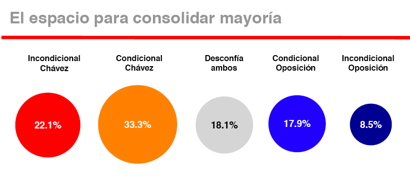
This next slide shows the country evenly split on whether to trust CNE. Two relevant things here: it contradicts the oppo sing-song that 80% abstention in December means 80% of voters don't trust CNE. It also belies Jorge Rodríguez's NAOR-based argument that vast majorities trust CNE.
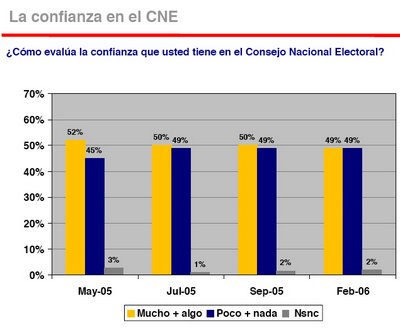
But then look what happens when you ask people why they think the opposition parties pulled out...
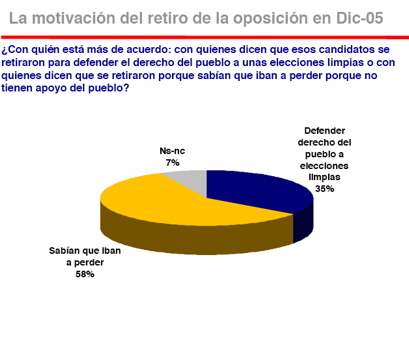
58% think the opposition pulled out because they knew they would lose. Not surprising given that, if they had voted on Dec. 4th, 61% say they would have voted for pro-Chavez parties and only 39% for opposition parties. 51% believe the withdrawal does not make the National Assembly less valid, while 43% think it makes it less valid.
This following one surprised me: it shows Primero Justicia's Julio Borges far out ahead of the pack of opposition pre-candidates, with Zulia governor Manuel Rosales running a creditable second. In polls, Teodoro languishes. In hypothetical head-to-head matchups, Chavez beats Borges 56%-34% (ouch!) and Teodoro 58% to 23% (double ouch!)
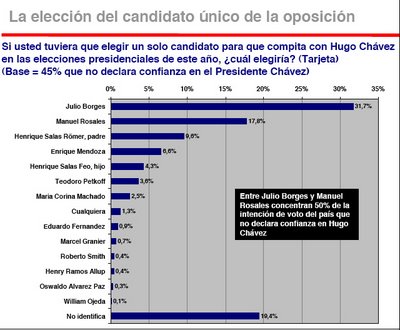
These next two slides really tend to make me think my countrymen have gone collectively insane:
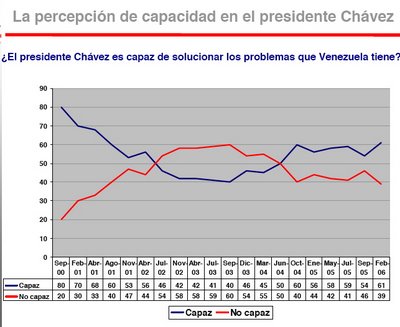
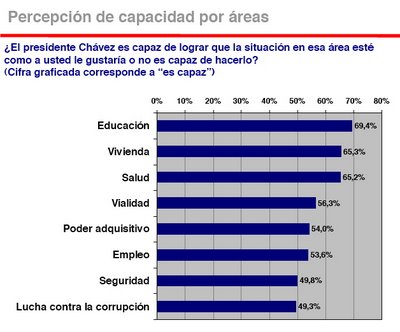
This last one in particular is just staggering - 65% think Chavez can solve the housing problem, Chavez's biggest performance black hole! Here my interpretative powers cease and I just stare at the screen in dismayed amazement. Hope springs eternal, I guess...or people just don't learn...
Anyway, the whole poll reads a bit like this. You find that 49% of respondents agree that Chavez strengthens their right to have private property, 49% think the Supreme Tribunal is working to solve the country's problems, that José Vicente Rangel has a higher favorable rating (34%) than Manuel Rosales (30%), and on and on and on.
You really have to comb through the slides to find any non-disastrous news for the anti-Chavez movement here (e.g. over 60% believe the media are working to solve the country's problems.) Otherwise...bleak, very bleak...
...and all this before the pre-electoral populist spending binge even starts...
How to waste a Saturday morning without really trying...
I realize looking at polling powerpoints isn't everyone's idea of a good time...for those of you who go for that sort of thing, though, it's a really fun site...
Some especially revealing slides:
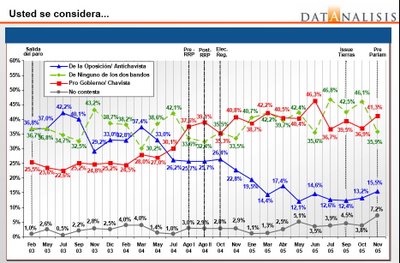
This slide, in particular, is revealing. It's not just Chávez's big surge in the months prior to the recall referendum in 2004, it's also the fact that they decided to pull out of parliamentary elections when they were at a whopping 15% in the polls. Under such conditions, it's not surprising that the high hopes that low turnout would delegitimize the government internationally weren't really met. In this polling context, who could take it seriously?
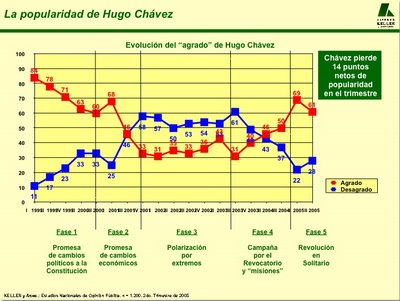
March 17, 2006
Claro que estoy en el ring...
1. He appeared on Alo Ciudadano
2. In answer to the question "estas en el ring?" (are you in the ring?) he answered (at the second try), "claro que estoy en el ring." (of course I'm in the ring."
The government immediately showed its democratic credentials by sticking in a five-minute cadena, full of Chávez's electoral propaganda, timed to wipe out the end of Alo Ciudadano and prevent Teodoro wrapping up his arguments OR responding to the government's gross and blatant abuse of state resources to promote Chávez's candidacy and disrupt a statement by his putative opponent.
Welcome to Bolivarian participatory democracy...
March 16, 2006
Pre-Recall Polls
Keller
Yes: 34%
No: 45%
Poll conducted June 14 - July 1st 2004
Hinterlaces
Yes: 40%
No: 51%
Poll conducted July 3 - July 18 2004
Evans McDonough
Yes: 41%
No: 49%
Poll conducted June 2004
Greenberg Quinlan Rosner Research Inc
Yes: 44%
No: 49%
Poll conducted June 2004
Indaga
Yes: 42%
No: 55%
Poll conducted June 2004
DATOS
Yes: 39%
No: 51%
Poll conducted June 2004
Consultores 21
Yes: 47%
No:53%
Tracking poll conducted through August 13, 2004
BUT:
Dantanalisis
Yes: 57%
No: 42%
Poll conducted May 10 and May 19
Seijas
Yes: 50%
No: 44%
Poll conducted July 2004.
Mercanalisis
Yes: 54%
No: 33%
Poll conducted May 20-June 5th
Consultores 21
Yes: 54%
No: 41%
Poll conducted June 2004
Source
Idiot Controversy Chronicles
The U.S. government warned Venezuela on Tuesday it would suspend Venezuelan flights to the United States if Caracas carries out a threat to ban or restrict U.S. carriers flying to Venezuela.
"Hopefully that will not happen. If that happens, it is not only possible or probable, but absolute certain the U.S. government and Transport Department would suspend flights by Venezuelan airlines," U.S. Ambassador to Caracas William Brownfield told reporters.
March 15, 2006
Sanity on the EU EOM
The final report isn't much different from the preliminary report. The main difference, as far as I can see, is a new recommendation for much deeper reform of the Electoral Registry (note, reform, not audit.) On page 23, the EU EOM notes that the ongoing calls for a REP "audit" are somewhat misplaced: the only credible way to get to the bottom of REP's "structural problems" (their phrase) is to cross-check it systematically against the Civil Registry. But, in practice, that's not possible, because there's no digital version of the Civil Registry. So the EU calls for deep reform, including an intriguing suggestion to merge REP outright with an overhauled, computerized Civil Registry.
Though the inevitable tug-of-war to highlight the parts of the report that "favor" one side or the other has already started, I'll do the unthinkable and highlight EU spokesman Doménico Tuccinardi's plea for people to attempt a holistic reading - resisting the urge to pick and choose between findings.
So while the EU EOM does highlight the need to stop using the Maisanta Software for political discrimination, it also notes that "in their electoral preparation, CNE demonstrated a clear will to respond to opposition demands and boost confidence in the process." While the report notes, on page 30, that it was possible to reconstruct the sequence of voting stored in the machines, it goes on to describe the likelihood that such data could be used to violate secret voting as "remote."
Their take on two very sensitive aspects seems worth citing at some length. First there's the matter of when, precisely, voting machines are hooked in to telecom networks (p. 53):
Results were transmitted very quickly and in an orderly fashion. When voting tables closed, their members printed final tally sheets without difficulties. They then connected the voting machines to a communications medium (in most cases a telephone land line) and sent the results to the Tallying Center in Caracas. We observed no ccases of results being transmitted before tally sheets had been printed and their results exhibited, which was a major charge after the Presidential Referendum.
Then there's the matter of the "hot" audit - which was conducted on the night of the vote, even though the results have still not been announced:
The closing procedures were followed in general terms, and in all voting centers where EU observers were present, they proceeded to a paper ballot recount audit ("recuento de resguardos de votacion.") The instructions to choose by lots the voting tables to be audited were not always followed. We observed the manual recount of paper ballots in 75 different voting tables. Although the recount procedure was slow, the results showed clearly the trustworthiness of the [electronic] results, except in a few cases where we observed a discrepancy between the number of voters counted in the voting rolls and those counted by the voting machines, and between the paper ballots and the votes registered by the voting machines. In 28% of observed cases there was a discrepancy between the number of votes counted by the voting machine and the paper ballots counted. The difference was, in all cases, between 1 and 5 votes, and was attributed to human error in the manual recount.
As I've written many times, this partial recount of paper ballots is the key safeguard in the whole system. Given that, according to the EU, the paper ballot recount went so well, it is just baffling to me why it takes CNE 10 weeks (and counting) to produce a damn report about it.
In any case it's true that these hot-audits are public events. Even if CNE takes forever and a day to publish results, if all the paper ballot audits were wildly out of line with the electronic results, people at each voting center would notice and word would get around awfully quickly. So CNE's delays are inexcusable, but this is still a significant and underestimated safeguard.
The EU OEM's fundamental overall conclusion, however, is impossible to deny: the biggest problem they observed is the lack of confidence in CNE. The report puts the call for a new, credible and impartial CNE at the top of its recommendations, and it seems clear to me that if that condition were met, the rest would follow...
March 14, 2006
Let him have it
Nobody seems to be paying attention to this, but the Chavez government has been lobbying intensively for the seat, with
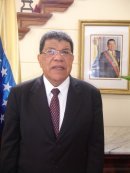 Guatemala as the other candidate. The lobbying has been in the best chavista tradition: vulgar, laden with overheated rhetoric and very indiscreet. Venezuela's Ambassador to Chile Víctor Delgado went out of his way to request Chile's support in exchange for Venezuela's support for Chile's candidate to head the OAS, current Secretary General José Miguel Insulza.
Guatemala as the other candidate. The lobbying has been in the best chavista tradition: vulgar, laden with overheated rhetoric and very indiscreet. Venezuela's Ambassador to Chile Víctor Delgado went out of his way to request Chile's support in exchange for Venezuela's support for Chile's candidate to head the OAS, current Secretary General José Miguel Insulza.I say: let him have it.
It is no secret why Chávez wants to go to the Security Council. In a year where the UN is bound to discuss sensitive topics such as Iran and North Korea, Chávez wants to be heard. His sympathy for rogue states like Iran, Zimbabwe and Cuba is not even up for discussion: Venezuela routinely votes in favor of those governments whenever issues arise in international fora. And Chávez's well-known penchant for flamboyant rhetoric and embarassing postures in international stages lures him to the very high-profile Security Council like light lures a moth.
Thing is, the Security Council is really managed by the five countries with veto power: the U.S., France, the U.K., Russia and China. The rest are there mostly for show. Chavez couldn't do much damage in the Security Council; certainly, he wouldn't have many friends there to help support Iran's nuclear weapons program and other nonsense. Venezuela's presence in the body would end up being all show and no substance, much like the government itself. But Venezuelan hystrionics in such a high-profile forum would shine a very bright, worldwide spotlight on Chavez's unique brand of intolerant extremism. To give Chavez a seat on the security council would be to give him just enough rope to hang himself.
And if getting the seat means Venezuela has to cash in its chips for all the favors it has spread around the continent, all the better. Chávez seems to want payback from the region - if he gets it, other Latin American countries may feel less obliged to pay lip service to El Loco when substantive discussions come up, for instance, on the dire state of Venezuelan democracy or human rights.
The OAS is bound to keep Venezuela on its agenda this year, what with electoral prospects getting increasingly worse and a new Presidential "election" coming up. Venezuelan democracy would be greatly favored if Latin American countries did not feel indebted to Chávez for his many favors. Getting him that coveted Security Council spot may just be a way to get this monkey off their back.
Frenchies horrified to be subjected to the Fidel Playbook
Attn. Mr. Willian Lara
Minister of Communications and Information
Dear Minister:
Reporters Without Borders would like to take advantage of your installation as Minister of Communication and Information on 9 March to refer to recent exchanges between the government you represent and our organisation. Our hope is to establish the basis for a real dialogue.
As a press freedom organisation, we recently issued two releases about cases currently before the courts that appear to be causing a controversy in the news media and public opinion in Venezuela. The first, on 27 February, took the form of an open letter to your predecessor, Yuri Pimentel, querying contempt of court proceedings against several news media. The second was about the detention on 7 March of Televisora del Táchira presenter Gustavo Azócar Alcalá on charges of fraud and embezzlement.
We were both astonished and shocked at the violence if the statements issued by your ministry on 1 and 9 March in response to our releases. We even posted - on the Spanish-language version of our website - Mr. Pimentel’s response to our open letter to him.
We were shocked because these statements contained many false accusations against Reporters Without Borders. The 9 March statement charged us with being “in the pay of the US government and secret services” and with undertaking “the media sabotage against the Bolivarian Revolution” ; In the eyes of your government, we were guilty of “defaming the Venezuelan people, despising Venezuela and meddling in its internal affairs”.
All this was said to be “with the complicity of the seditious opposition and the privately-owned media, in a new media offensive that is part of the psychological war operations of the Empire - the United States - designed to justify its aggression against Venezuelan democracy”.
In both cases, we just expressed our concern about specific legal issues without questioning the principle of the proceedings and without in any way denigrating the authorities responsible. Concern does not mean condemnation.
It is the job of every NGO to question democratic governments about the principles or causes they claim to defend. We have, it is true, criticised parts of the law on the social responsibility of the news media and the criminal code reform law. We fear that some of the provisions of these laws restrict press freedom. But have we said there will be no more press freedom in Venezuela ? No, we have not. And criticising a law is not the same as condemning a government.
This is the reason for our astonishment. On the one hand, we know that the situation of journalists is much more dramatic in countries such as Mexico and Colombia in which, unlike Venezuela, they are exposed to reprisals from armed groups. On the other hand, we also condemned the imprisonment of Judith Miller of The New York Times from July to September 2005 in the United States just for refusing to reveal her sources to the judicial authorities.
We have also paid a great deal of attention to the case of Al-Jazeera cameraman Sami al-Hajj, who has been held for nearly four years on the US naval base at Guantánamo Bay without specific charges being brought against him and in conditions that violate all international human rights conventions. We urge you to read our recent report, available on our website, which has a title that could not be clearer about its content : “Camp Bucca and Guantánamo : when American imprisons journalists”. We are ready to send you a copy.
We have not failed to understand the role of certain privately-owned Venezuelan news media during the period of the April 2002 coup, and we stressed this at the time. We therefore find it all the harder to understand why your government is the only one to be unable to tolerate any criticism at all.
Finally, we do indeed receive funding from the National Endowment for Democracy. This financing represents 3 per cent of our budget - our accounts are public - and, aside from the fact that it comes from the US congress and not the White House, it is assigned to our activities in support of imprisoned African journalists. It has nothing to do with western hemisphere.
I very much hope your will heed our appeal.
Sincerely,
Robert Ménard
Secretary-General
There's something touching, almost quaint, about RSF's tone here...something about their earnest explanations about what they use their NED funding for (as though that's gonna make a difference), something about their shock that a government can't understand that "criticising a law is not the same as condemning a government." It all makes you wonder if they've really been paying attention.
Don't get me wrong, I'm a big RSF fan, but they're about six years behind the curve on this one: Venezuelan dissidents were writing in this tone all the way back in 2000, when we questioned the adoption of Chavez's 49 decree-laws under Enabling Legislation only to be roundly abused as counterrevolutionary elements, enemies of the people, etc. etc.
Time lag and all, it's interesting to see a high-profile foreign NGO going through the same process we all went through back then, coming to understand the autocratic core of a regime that slams moderate and radical critics alike, with the same self-righteous intolerance and rhetorical brutality. Slowly, but surely, the penny is dropping in Paris: chavismo recognizes no space for legitimate dissent.
March 13, 2006
Zero-Kelvin Audit
Well, it's now been ten weeks since we voted and CNE has only now finished its "hot" audit. Finished conducting it, that is, because the actual report won't be published for some time yet. Ahhh, the warm glow of transparency...
This must be why, according to NAOR, 74% of Venezuelans trust CNE.
President Chavez renewed his readiness to carry out any role to be asked by the Leader of the Revolution
President Hugo Chavez of Venezuela, the Gaddafi Human Rights Prize Laureate, expressed his profound appreciation to the Leader of the Revolution, renewing his invitation to visit Venezuela and Latin American.
This came during his reception of the Secretary of Co-operation at the General People's Committee for Foreign Liaison and International Co-operation in Valparaiso City in Chile at the sideline of the inauguration of President Michelle Bachelet as a President of Chile.
President Chavez underlined the importance that the leader devoutes some of his time to the Latin America continent which peoples he said had all respect and gratitude to the Leader Mu'ammer al-Gathafi.
President Chavez renewed his readiness to carry out any role to be asked by the Leader of the Revolution, pointing out that Latin America began speeding up towards the realization of its peoples' aspirations and hopes for unity and integration.
President of Venezuela conveyed during the audience through the Secretary his greetings and appreciation to the Leader.
Excellence in polling methodology...
(I swear this is not a malicious translation - the original question in Spanish is just as weirdly non-sensical...plus, what the hell is the difference between "sin incertidumbre" and "con nada de incertidumbre"?! What kind of baboon structures a poll response this way?)
(Good thing that's not a leading question, huh?)
And to think they say NAOR's polling isn't professional!
(Sorry, no idea why the spacing got so screwed up...)
March 12, 2006
Links ahoy!
Teodoro's Strange Isolation
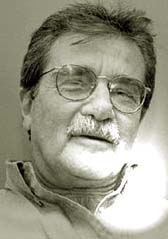
The structure of the Venezuelan electorate really hasn't changed in the last few years. Something like 25% of the electorate is strongly pro-Chavez, something like 20% is strongly anti-Chavez, and the largest chunk, over half, floats between the two camps. To win, an opposition candidate needs to hold on to the anti-Chavez base while attracting more than half of the floating voters.
Thing is, you can't attract those waverers if you don't know who they are, what they want and why the vote for who they vote for. You need a specific, thought-out strategy to identify them and target them, and I worry that Teodoro hasn't quite grasped this.
Floating voters are basically poor people, living in barrios and down-and-out urbanizaciones, without a university education, focused more on bread-and-butter issues than on ideological niceties. In the last few years most of them have voted for Chavez as part of a clientelist quid-pro-quo: my vote for your petrodollars. You don't win over waverers by waxing lyrical about freedom and democracy or denouncing castrocomunismo, you get their votes by persuading them they'll be better off with you in Miraflores than with Chavez.
Teodoro faces challenges all around. To begin with, he can't necessarily count on the anti-Chavez ultras. It's not just that the CNE polemic has left many of them unwilling to vote at all, it's that most of them are ideological conservative and instinctively distrust any leftish candidate. No matter how moderate Teodoro's stance gets, a good number of militant anti-Chavistas just can't stomach voting for a former guerrillero.
This would be okay if Teodoro could count on solid support from floating voters. And, in principle, waverers should love him: he's been a consistent critic of the more ideologically-strident elements of the Opposition, which are major culprits in floating voters' strong distaste for the Traditional Opposition.
But Teodoro is too much of an intellectual to be a darling of the non-ideological waverers. He's not willing to pander aggressively to them. He makes his pitch in terms so abstract ("a modern, democratic left") that you get the feeling many waverers just won't know what on earth he's talking about. Even if they do understand what he's getting at, the fact is you can't eat a "modern, democratic left" - too often, his language is too high fallutin' to resonate viscerally with people's day-to-day concerns. Needless to say, Teodoro can't make up the difference by spreading oil money around like his opponent can, which leaves you to wonder if he can really mobilize enough waverers to be competitive.
To my mind, Teodoro is oddly politically homeless for a putative oppo front-runner. His main strength - his ability to mete out memorable tongue lashings to both the government and the radical opposition - makes him as many enemies as friends, while leaving non-ideological voters basically cold. Fatally, his only natural constituency seems to be people like me: over-educated, instinctively moderate, incurably wonkish and respectably leftish types- an electoral dead-end if ever there was one.
If he's going to position himself to actually win an election, Teodoro is going to have to develop a far less abstract pitch, one that resonates with wavering voters at a gut level. Colorful denunciations of Chavez that peter out into abstractions about the state's role in development will not do the trick. Using dictionary words that get knowing chuckles from university-educated readers might be a good way to prop up Tal Cual's circulation figures, but if his shtick is going to play in Caucagüita Teodoro has to stop saying "inefable" once a paragraph.
To my mind, his best bet would be to just shamelessly plunder Roberto Smith's formidable rhetorical arsenal. Unlike Teodoro, Smith has thought through these issues systematically and worked diligently to figure out which rhetorical strategies can win over wavering voters. Focus grouping the hell out of your message to strategically brand the candidate is an admittedly gringo way of going about an election, but taking a scientific approach to pandering is far preferable to sticking to rhetorical lines that may "feel right" to a candidate but in fact turn off the very people he should be attracting.
Is Teodoro willing to go down this route, or is it below his dignity? Hmmmm...
March 10, 2006
Naoricide
Chávez’s Favorite Pollster Passes Itself Off as American
by Gerardo Reyes
When high ranking members of the administration in Venezuela cite the North American Opinion Research (NAOR) polling firm, Hugo Chávez's favorite, they note with a certain pride that the firm is from the United States, which apparently gives it an aura of independence and seriousness.
However, at the address that appears registered as the headquarters of NAOR in the United States, in southeast Miami, there's an accountant’s office and they haven’t even heard of the company.
At the time it was entered into the corporate registry in Florida in March of 2004, at this address –1549 NE 123 St.—there was a health clinic operating there, according to the receptionist of the locale where the Certified Public Accountants’ office is now found.
One of the accountants, who identified himself as Jacobo Nae, told El Nuevo Herald that he has no idea what NAOR is, although he did say that one of he functions of his firm is to create dozens of companies each month.
El Nuevo Herald was able to verify last Friday that at the office on 1549 NE 123 ST in Miami, listed as the company's main address, there are no analysts, statisticians, pollsters, nor polls. There were only clients waiting for help filing their tax.
The company has been questioned in Venezuela for what its critics consider a clear tendency to favor the government and for results inconsistent with major pollsters.
Carlos Sánchez, director of operations and spokesman for NAOR in Caracas, told El Nuevo Herald that he was not aware that the headquarters of the firm in the United States is an accountants’ office.
“I manage the part of Latin America,” said Sánchez. “I cannot answer for the United States.”
On Thursday, Sánchez offered to put one of our reporters in touch with the administrators of the company in the United States, but El Nuevo Herald received no call regarding the matter.
According to the corporate registries of Florida, the president of NAOR is Alirio Valbuena and the secretary of the company is Kaysa Makarem. According to several articles published in the press, Sánchez, President Chávez and other members of the Venezuelan government emphasize that “it is a North American company” when they want to highlight its independence.
In Peru, the firm also has made public controversial polls favoring nationalist presidential candidate Ollanta Humala, an admirer of Chávez.
This is not the first that that the seriousness and independence of the company has been placed in doubt. Academic investigators from the Central University of Venezuela and British reporter Aleksander Boyd have asked similar questions.
Recently, Boyd found that in the same offices where NAOR operates in Miami and in Caracas, the headquarters of Petrotulsa can also be found. Petrotulsa has been favored by state-owned PDVSA with contracts and projects.
On its website, Petrotulsa mentions as the company’s activities the cleaning of oil wells for PDVSA en the fields of Bares and Melones in Anzoátegui state.
The industry publication Oilgram News reported in 2002 that, along with Asea Brown, Petrotulsa proposed to the Ministry of Energy of Venezuela a project for the construction of a new refinery in Venezuela with a 130,000 barrels/day capacity worth $2 billion.
The announcement was made by Ricardo Valbuena, who introduced himself as the president of the company. The refinery has not been constructed.
Sánchez responded that he does not believe there exists any conflict of interest that puts the independence of the polling firm at risk due to the fact that the same office operates a petroleum company that is granted contracts by the government, or the fact that the directors of the companies are related.
“If we had something bad, we would be hiding and we are not hiding”, said Sánchez.
The manager refused to reveal the owners of the polling firm or the members of its Board of Directors.
In the corporate archives of Florida, Petrotulsa registered as its president Julio Makarem and as its secretary Kaysa Makarem. Kaysa is also the secretary of NAOR. The address of the petroleum company in the United States is the same as NAOR’s in Maimi.
Just as El Nuevo Herald reported in 2002, Petrotulsa was registered as a contributor to Chávez’s election campaign, according to the donor list that the Fifth Republic Movement (MVR) declared in the period from August to December of 1998.
On of the most recent polls from NAOR (February) gives Chávez 66% of intended vtes for the presidential elections at the end of the year. But perhaps the most criticized of the polls is the one that predicted that on November 2 of 2005 the abstention rate for the election of deputies and governors would not exceed 13 percent. The abstention rate was more than 74 percent.
Sánchez explained that the rain on election day and the withdrawal of the opposition were unforeseeable factors that distorted the results.
“We are the only polling firm that goes into the hills [where poor people live]”, said Sánchez.
A group of academics led by professor Manuel Rodríguez Mena, former dean of the Social and Economics Sciences Faculty at the Central University of Venezuela, has followed closely that activities of NAOR for an investigative project entitled Manipulation of Venezuelan Social Expression from 2004-2005.
In a preliminary report, after reviewing results from the poll on abstention and other inconsistencies, the study suggests that the possibility that [NAOR] is an “incompetent company” or that “the company manipulates the expression of public opinion”.
“One of the worst aggressions that can be committed against a society”, expressed Rodríguez Mena, “is to manipulate its social expression. I have the impression that this is not a polling firm, but an unpollster.”
NAOR never...
As self-justification, the ad is counterproductive enough to make you weep: crammed full of chavista buzzwords and rhetorical flourishes ("parlamentarismo de calle," the "illusion of democracy under puntofijismo," etc. etc.) and flouting their official connections (by demanding a parliamentary investigation and a personal meeting with Chavez) Makarem and Valbuena do a much better job than their critics ever could at proving what we've been saying all along: that they're dyed-in-the-wool chavistas.
As intimidation, the ad is more than hopeless. Whether you love his writing or hate it (or, as I do, both) - one thing is clear: you won't get Alek off your back with this kind of shenanigan. Having earned a permanent spot on his shit list, Makarem and Valbuena can now look forward to years of further research published on VCrisis. Same goes for Gustavo...
Public relations management doesn't get much more self-defeating than this. Makarem and Valbuena work off the maxim that if you get stung by a wasp, you get a club, follow it back to its nest, and whack it. Breathing new life into a story that would have died of disinterest all by itself, they get half of Noticiero Digital up in arms about it, major gringo blogs noting it, and, of course, many more journalists aware of the story.
Thanks, guys! When it comes to discrediting your own "polling" y'all are way more effective than the oppo's English-language blogosphere...
My, my. For sure the funnest thing to come out of this absurd little hubbub is this piece in Miami's El Nuevo Herald, where Gerardo Reyes checks out the address NAOR lists as its main office in the States, only to be met with blank stares by the office workers there. Hillarity ensues when Carlos Sanchez, NAOR's chief hack back in Caracas, shrugs the whole thing off, saying he only deals with the Latin American "side" of the business (as though there were another "side") and so can't comment on the fact that his company's headquarters doesn't exist. (For the Spanish readers out there, Reyes's piece really is required reading.)
NAOR's hackistry really is appalling, but sometimes I almost feel for them. Maybe these guys are just really unlucky - starting with the fact that they picked that name for a pro-Chavez mystery-pollster just before El Supremo recast his entire rhetorical arsenal around a denunciation of all things North American. Man! That's just bad luck.
Bad, however, doesn't even begin to describe the web-design NAOR hired to skirt the charge that they didn't even have a damn website. Registered just over a month ago, NAOR's new website just about makes your eyes bleed in the process of transmitting virtually no information. That awful, awful beeping! Plus, just to add to the already thick web of their government connections, they hired the same web-designer behind National Assembly TV. Dig dig, dig dig...
There are any number of angles you could take on this little saga. I should probably excorciate Alek for undermining the credibility of his own research by weighing it down with random insults and deliciously juicy but rumor-based little morsels that, even if true, he probably can't prove. (Why speculate when you have them by the cojones?!) I could follow up on the UCV social scientists tracking NAOR's activities. I might decry the fact that it is these unpollsters that Jorge Rodriguez cites to prove that no, really, the country really does trust him, or track down some more material on Makarem clan's assorted other business ventures.
For now, though, I'll just bask in NAOR's total credibility self-destruct.
March 9, 2006
Some rhetorical questions nobody seems to ask...
What I'm getting at is that Opposition politicos seem to have a warped understanding of what a political party is.
A political party is supposed to be an institutional mechanism that alligns and coordinates the political activities of broad sectors of society sharing a basic vision even if, unsurprisingly, its members disagree on various points.
In order to aggregate their strengths, party members come to understand that they have to accept a measure of discipline, a broad commitment to cooperate, to sing from a single hymn sheet even if they might each quibble with some of the notes. This doesn't mean that they contract-out their judgment to party leaders, or that they stop discussing their disagreements. It means that they agree to process their disagreements through an institutional mechanism that prevents their petty disputes from impairing their collective ability to act effectively in the broader political sphere.
For these reasons, in most Western countries politicians understand that for a political party to be at all effective, it needs to be broad. Ken Livingstone can share a political party with Tony Blair, Dennis Kucinich with Joe Lieberman, and Felipe Gonzalez with Rodriguez Zapatero.
Does that mean they stop disagreeing? No. It means that they understand that, on balance, their agreements outweigh their disagreements and that the benefits, in terms of political effectiveness, they get from processing their disagreements inside a single organization outweigh the costs of fragmentation.
This line of reasoning just doesn't seem to occur to the Venezuelan Opposition, where parties proliferate not because their leaders disagree on anything substantial, but simply because each would rather be a bigger fish in a smaller pond than a smaller fish in a bigger pond.
The costs of this attitude, in terms of disorganization, disaggregation, mixed messages, wasteful bickering, intra-coalition competition and overall incoherence barely figure in their calculation. So parties proliferate ad infinitum, with a cacique-to-indio ratio that increases exponentially until none of the parties is able to be at all effective...or even to exist, in any meaningful sense, beyond the confines of a TV studio.
It's hardly surprising that a political opposition "organized" in this way can't lead the anti-Chavez movement, and ends up, instead, reacting to waves of opinion it can't control.
My point in raising these questions - especially the last one - is that Chavez is a big, big problem - so big, in fact, that the obsessive concern with attacking his government stiffles debate on a series of lesser, but still very important problems - like the little matter of the self-defeating fragmentation of opposition parties. It's always more comfortable for an Antonio Ledezma or a Cesar Perez Vivas to rant against Chavez than to question the crazy structure of the opposition.
So they don't. And we don't. And so we're ineffective...in great part, because we can't be bothered to sort out a political organization within the anti-Chavez camp that might make us effective.
March 7, 2006
Teodoro and South Korea
Emerging from the abyssIn this editorial, Teodoro shows himself as a transformational thinker - not someone who'll be content with tinkering around the edges of povert or managing our abysmal backwardness, but someone with a vision to transform the country into a radically different, more prosperous, more human place. Thinking about South Korea, thinking about what it takes to turn a poor country into a rich country is what we need to resist the tyranny of low aspirations, to the depressing myopia of revolutionaries who aspire only to redistributing too small a cake rather than working to generate enough wealth for all. Even posing the question in these terms is a radical departure for a Venezuelan politician, and a necessary one at that...
In 1950 South Korea had a per capita income below $100 per year. At the time, ours was around $3,000. Today, the income per head in that Asian country is about $15,000 and we are, if we exclude the recent oil windfall years, more or less where we were half a century ago. Since then, Korea has had to overcome the devastating consequences of the three years of war that set its two halves against one another, and now operates as one of the small powers of the world economy.
Without oil, without iron, without bauxite, it has a cutting age heavy naval industry which puts out the largest ships that travel the world's seas; its automotive industry is world class and Korean cars travel every road in the world; its electronics industry is among the best in the world. Incidentally, South Korea spends 3% of its GDP on science and technology.
That's one of the secrets of its success. Its stunning infrastructure and the millions of homes built at an astounding rate speak of the country's dynamism, where poverty levels are also among the lowest in the world.
It's worth pointing to the sense of nationhood, of national purpose, that gave continuity over decades to an economic policy based on a strong state, a disciplinary state, that set out great national goals and set out the means to achieve them, stimulating that which became, over time, a powerful private sector, guided by state policies towards the world market. South Korea faced up to globalization and did it with particular success.
No doubt there are problems, but the contrast between what happened in that small Asian country and what has happened in ours over the last half century is too striking not to spark in depth reflection about ourselves. Especially now, when our country, again flooded with unimaginable financial resources, heads once again towards wasting an opportunity to overcome our backwardness, poverty and weakness.
A trip to South Korea reaffirms our conviction that if others can take on the road to development, it is within our reach also. But first of all, we need a sense of national purpose, an encompassing accord that sharpens all our strengths and takes advantage of our immense possibilities.
And then they were ten...
- First, the National Assembly selects a Preliminary Committee of Assembly Members to select Civil Society's representatives on the CNE Nominations Committee. (Done.)
- That Preliminary Committee solicits input from civil society organizations for people to sit on the CNE Nominations Committee. (Done)
- The Preliminary Committee checks the people suggested by civil society to serve on the CNE Nominations Committee and drafts a preliminary list of vetted candidates. (Done)
- The National Assembly selects ten people from the list drafted by the Preliminary Committee to serve as Civil Socety representatives on the CNE Nominations Committee (this happened yesterday.)
- Those ten Civil Society representatives sit on the CNE Nominations Committee alongside 11 National Assembly Members. (This is the next step.)
- The 21-member CNE Nominations Committee solicits civil society for possible CNE board members.
- The CNE Nominations Committee picks a short-list of qualified, impartial candidates for the CNE board
- Chavez chooses the five he likes best. (OK, ok, officially the National Assembly selects five names from the CNE Nominations Committee's short-list by a two-thirds majority, but lets get real here.)
The ten civil society representatives who will sit alongside the 11 chavista Assembly Members on the CNE Nominations Committee are:
- Antonieta di Stefano, chavista, Misión Cultura bureaucrat.
- Orlando González, no Google Trail.
- Alberto Lovera De Sola, opposition, sifrino civil society activist and anti decree-1011 agitator.
- José Luis Machado, opposition, one-time deputy chairman of the Lara State Bar (Colegio de Abogados.)
- Rafael Madrid Maya, no Google Trail.
- Humberto Rafael Mendoza, ambiguous Google Trail (could he be this Humberto Mendoza, Teodoro Petkoff's lawyer?)
- Gilberto Guerrero Quintero, chavista, former Supreme Tribunal substitute magistrate, expert on leasing law.
- Fernando González Jiménez, antichavista. Skimpy Google trail, but did sign this anti-government petition.
- José Diógenes Muziotti, chavista, nominated to CNE last time around by something called the Frente Bolivariano Popular Unico de Trabajadores y Cesantes Petroleros, Petroquímicos, Metalúrgicos y de la Construcción del Estado Zulia.
- Marlene Robles de Rodríguez, hard to pin-down, but appears Ni-Niish. Chairwoman of the Carabobo State Bar (Colegio de Abogados)
As it stands, I count 3 chavistas, 3 or 4 antichavistas (depends how you classify Humberto Mendoza), 1 Ni Ni, and 2 or 3 unknown quantities. This means the ultimate CNE Nominations Committee will have at least 14 chavistas (the 11 AN members plus Muziotti, Guerrero Quintero and di Stefano.)
The government is clearly in the driver's seat here. It would take an ocean of naïveté to think the Assembly would select a CNE board Chavez doesn't approve of - a movement that has explicitly attacked the representative role of the Assembly and promoted loyalty to the leader as the cardinal political virtue cannot seriously be expected to make a decision this sensitive without at least his tacit approval. After all, Chávez es el pueblo.
So after this whole byzantine rigmarole, we're more or less where we've been all along: does Chavez want a broadly acceptable CNE, or does he prefer to run alone? It's his call to make...
March 6, 2006
Iran-Venezuela trade volume to hit $11b
Construction of two dairy factories and a box-making company, an agricultural MOU, and the contract on cooperation of Iran-Venezuela Chamber of Commerce are other issues agreed by the two parts, he further explained.More
Tehran and Venezuela also inked MOUs on building the plastic parts of automobiles, and establishment of the production line of home appliances, he noted. At the first phase of producing home appliances, 100,000 refrigerators will be produced, followed by other appliances such as washing machines at the next stages, he added.
Shaterzadeh put the current volume of bilateral contracts at $7 billion, stating, “The figure is predicted to be increased to $11 billion by signing the new agreements.”
March 5, 2006
Reading the CNE Nominations Committee Tea Leaves
- First, the National Assembly selects a Preliminary Committee of Assembly Members to select Civil Society's representatives on the CNE Nominations Committee. (Done.)
- That Preliminary Committee solicits input from civil society organizations for people to sit on the CNE Nominations Committee. (Done)
- The Preliminary Committee checks the people suggested by civil society to serve on the CNE Nominations Committee and drafts a preliminary list of vetted candidates. (We are here.)
- The National Assembly selects ten people from the list drafted by the Preliminary Committee to serve as Civil Socety representatives on the CNE Nominations Committee (this is the next step.)
- Those ten Civil Society representatives sit on the CNE Nominations Committee alongside 11 National Assembly Members.
- The 21-member CNE Nominations Committee solicits civil society for possible CNE board members.
- The CNE Nominations Committee picks a short-list of qualified, impartial candidates for the CNE board
- Chavez chooses the five he likes best. (OK, ok, officially the National Assembly selects five names from the CNE Nominations Committee's short-list by a two-thirds majority, but lets get real here.)
Today, the Preliminary Committee completed step 3, handing down a list of 57 vetted civil society candidates for the CNE Nominations Committee. I decided to spend three hours of this lazy Sunday googling them one-by-one.
The punchline: the preliminary list includes 16 chavistas, 11 opposition members and six nominees that are not clearly affiliated with one side or the other. The rest of the list doesn't have a discernible Google Trail.
Highlights from my little Google Hunt:
- The chavistas include Ismael Garcia's Lawyer (Leon Izaguirre) a former MVR mayor of Tinaquillos (Dimas Ramos Cava), and a former "substitute magistrate" of the Supreme Tribunal (Gilberto Guerrero Quintero), as well as a far out Chavista poet (José Humberto Guariguata) and a revolutionary co-op bureaucrat (Samuel Rojas.)
- The oppo group includes a member of Mujeres por Venezuela (Beatriz Barbosa), a Monte Avila University (i.e. Opus Dei) professor (Ernesto Fronjosa), Queremos Elegir co-founder José Cova, the Bandera Roja chairman of the Federacion de Centros Universitarios (Ivan Stalin González Montaño), Asamblea de Educacion's Rodolfo Rico and Momento de la Gente's Cira Romero. Intriguingly, it also includes an Emilio Regalado Pacheco who, his Google Trail suggests, may be a Proveo member. Maybe Alek can tell us more about this guy.
- The Ni-Ni group's most notable member is Antonio París, president of the Universidad Central de Venezuela.
- Some member's of that sad breed - the Google Trail-less - include: Arturo Álvarez Vegas, Esperanza Aquerreta Camacho, Rafael Madriz Maya, Dorys Medina, José Inés Molla, Miriam Josefina Naranjo Ortega, Adan Rafael Navas Nieves, Mary Reina Rojas Serra, Braulio José Romero Barrios, Eliécer Salinas Del Pino, Ismer Romer Serrano Flores, Lucía Patricia Suárez de Gómez, Miguel Ángel Vásquez Gómez, Enrique Vásquez de la Torre, Edgar Rafael Velásquez. If any of those names rings a bell, do write in.
March 4, 2006
The road not taken...
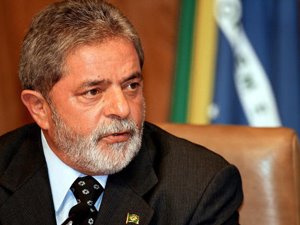
Lula's leapIn fact, the whole piece reads like a catalog of Chavez's wasted opportunities. Read it all.
That the mass of Brazilians seems prepared to overlook the PT's misdeeds suggests that Lula got two big things right: the economy and poverty alleviation. Comparing Brazil's vital indicators when Lula took over with the same ones now “is like looking at two different economies”, says Vinod Thomas, former head of the World Bank in Brazil. In the autumn of 2002, Brazil's currency, the real, plunged, largely because the markets feared Lula's arrival. Inflation, already in double digits, threatened to spike higher and the yield on Brazil's dollar bonds was 25 percentage points above that of American Treasuries. The new government swerved away from disaster. The finance minister, Antonio Palocci, raised the target for the public sector's primary surplus (before interest payments) by half a percentage point to 4.25% of GDP, persuading the markets that Lula could be trusted to pay Brazil's public debt. The central bank steadied the real and raised interest rates to choke inflation.
An economy that swooned every time confidence in emerging markets wobbled now looks steadier. Spurred by a devaluation in 1999 and buoyant demand for commodities, exports have boomed, turning a current-account deficit into surplus. Mr Palocci has used the inflow of dollars to pay off foreign creditors, including the IMF. Soon, Brazil will no longer have to worry about a falling real driving up its debt burden. The risk premium has fallen to a record low of two percentage points.
...
Lula points out that the government has not raised a single tax rate yet. Revenue is up because profits are higher and tax collection is better. As this improves, “we'll be able to reduce the tax burden by cutting rates and expanding the base of contributors”. For Lula, sure growth is worth more than fast growth. “I don't want to grow 10% or 15% a year. I want a lasting cycle of growth averaging 4% or 5%.” There will be “no magic in the economy”, he says. This year growth should be around 3.5%.
But stability has its own subtle magic. It protects the value of salaries and encourages business to plan long term. “The capital market is now an option” for financing infrastructure, says Paulo Godoy, president of the ABDIB, a group representing infrastructure firms. Despite high interest rates, consumer credit surged after the government let banks lend to consumers against their paycheques. This contributed to what will no doubt be the PT's favourite campaign statistic: 3.5m jobs created in the formal sector between 2003 and 2005.
This points to a second achievement: a reduction in poverty and inequality—the blight that Lula was elected to combat. A poverty index tracked by the Fundação Getulio Vargas (FGV), a business school, fell from 27.3% of the population in 2003 to 25.1% in 2004. Strong economic growth in 2004 helped. More important, says Marcelo Neri of FGV, was a sharp drop in inequality, which is “now at its lowest level in the past 30 years, and still falling.”
Dangerous Liaisons
 Knight Ridder newspaper readers throughout the US woke up today to find this piece by Steven Dudley in their morning paper:
Knight Ridder newspaper readers throughout the US woke up today to find this piece by Steven Dudley in their morning paper:Chavez's wooing of Iran called troublingThing is, when you're dealing with two regimes as opaque as these two, you get the distinct feeling that the public, above-board ties are very much the tip of the iceberg. What do these guys get up to behind closed doors? You can't help but wonder...
They started with an agreement to build tractors, but Iran and Venezuela have quickly moved to oil, cement, homes, auto parts, shipbuilding and perhaps even nuclear energy. The new friendship between the two deeply anti-American governments was further cemented last month as Iranian Parliament speaker Gholam Ali Haddad Adel headed a delegation that visited Venezuela and drew expressions of support from populist President Hugo Chavez.
"It's a natural byproduct of their confrontation with the United States," said Armando Duran, a columnist and former Venezuelan foreign minister. "Chavez looks for an alliance with those who confront the U.S." Iran is not the first or last openly anti-Western Middle Eastern government that has warm relations with Caracas. As an OPEC member, Chavez courted Libya leader Moammar Gadhafi and Iraqi President Saddam Hussein, and last month endorsed the Palestinian government of Hamas, which Washington and Europe regard as a terrorist organization.
But few countries are as embroiled in as serious an international controversy as Iran, accused of seeking nuclear weapons. Venezuela joined Cuba and Syria as the only countries to vote in the International Atomic Energy Agency last month against reporting Iran to the U.N. Security Council.
More...

